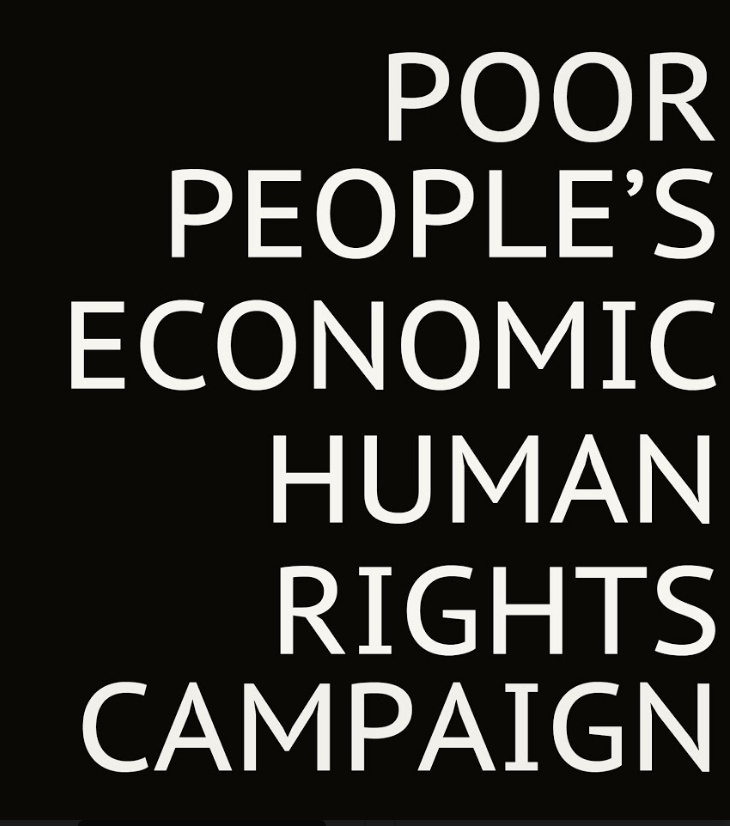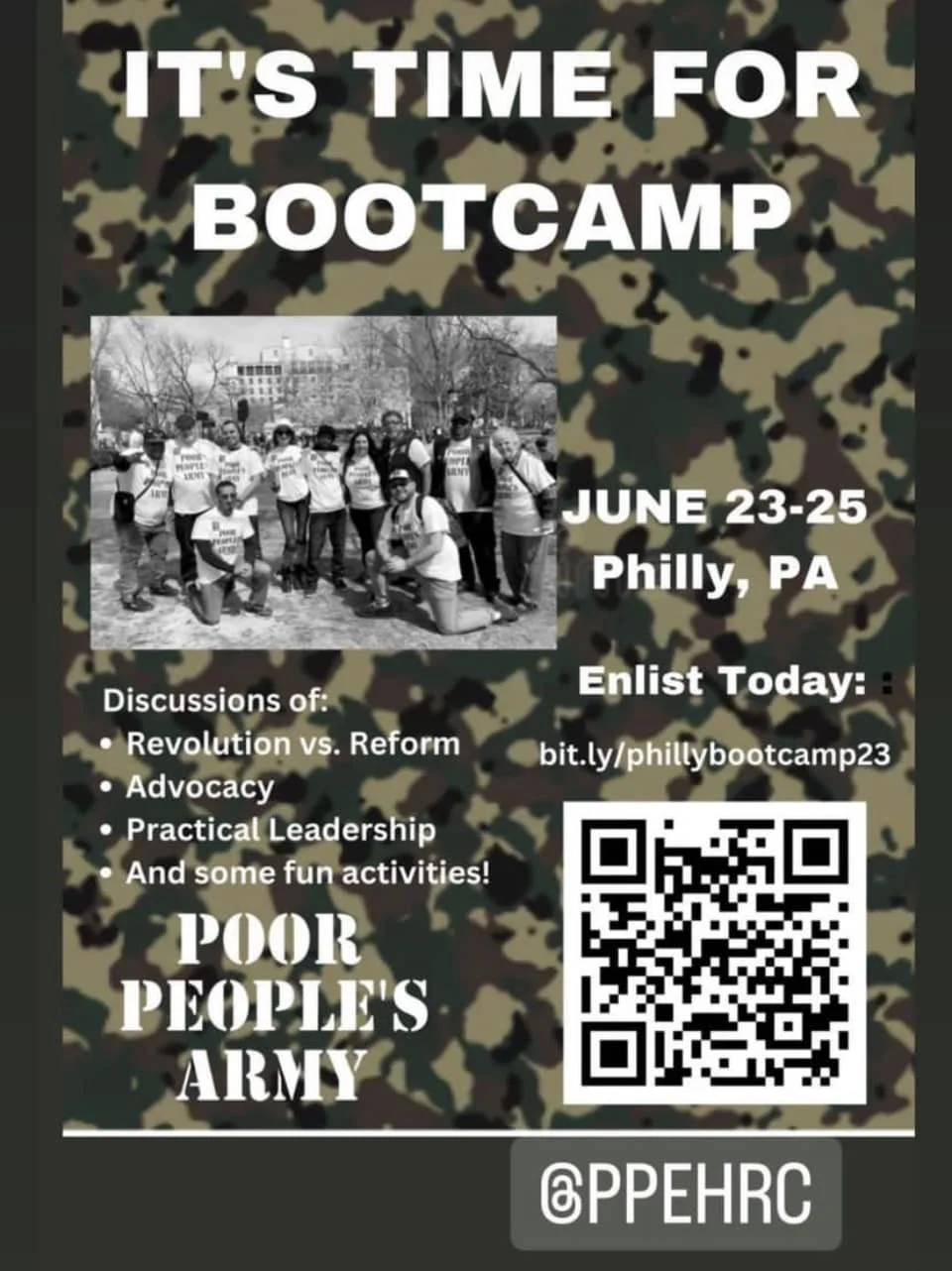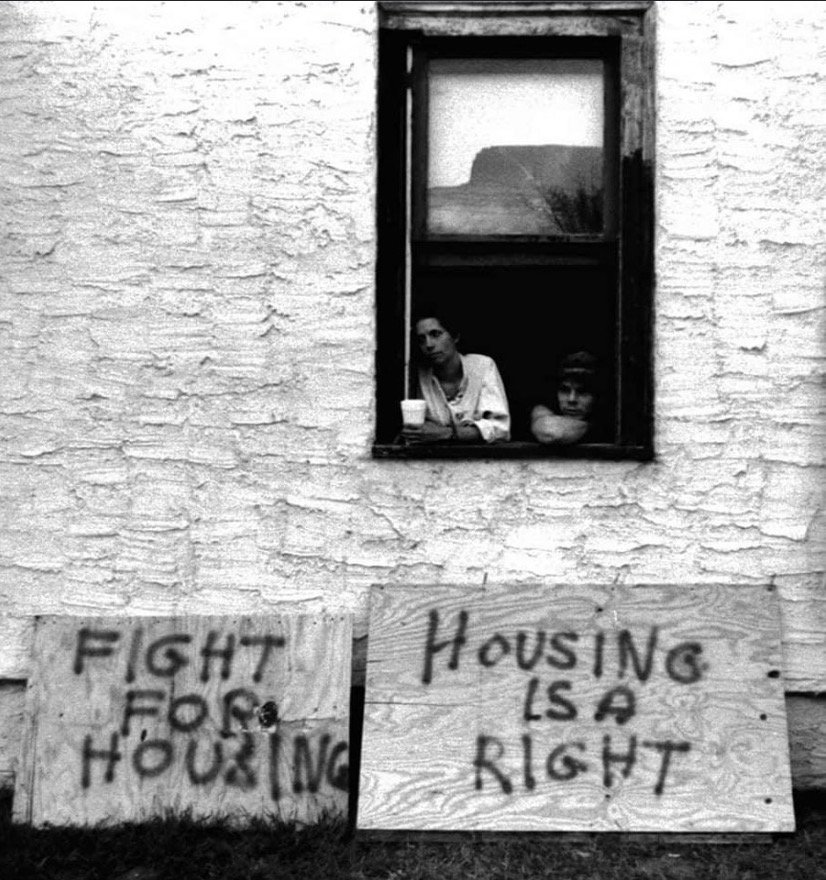Mission
(The Poor People’s Army is also known as the Poor People’s Economic Human Rights Campaign which was formerly the Kensington Welfare Rights Union)
MISSION: We are building a nonviolent Poor People’s Army to keep people alive and to build a cooperative economy and society.
Our progam
Poor People’s Army is a nonviolent army based in the U.S. Our headquarters are in Philadelphia. We are a 3 decades old movement that came out of the welfare rights and anti poverty movements of the 60s 70s and 80s, and we were founded and are led by poor people, homeless people, people at the bottom that want the power to control our own destinies. We want to see a cooperative society where everyone gets what they need. We live in a world where it is possible for every human being to have the basic necessities of life and live a comfortable life. We know that rich people and corporations will not willingly share the wealth and resources the world has to offer. The rich undemocratically hoard the wealth, the world’s abundant resources, and the incredible productive powers that could allow for all humans to flourish.
We understand that the rich are at war with us daily and use a variety of means to fight against poor and working people. Therefore we must form an army to fight back. Poor and working people endure violence at the hands of the police, the courts, and the prisons. We endure violence from corporations that influence and control laws that make us slave away or starve while they reap higher and higher profits, corporations that poison our water, air, and soil, corporations that are literally creating the conditions for mass extinction and climate catastrophes that impacts billions of people across the globe. We endure violence from a healthcare system that excludes us, that ignores our mental health, that treats our addictions and sorrows as personal failures. We endure violence from systems put in place to criminalize poverty and punish poor parents, by breaking up families, by removing children from their homes, by imprisoning and punishing poor parents and caregivers.
While the world at times seems hopeless, we look back to systems of oppression in the past that fell under their own weight… Systems of brutal slavery and oppression, Monarchs that people thought were ordained by God, Empires that spanned the globe, colonialism. We take not only inspiration from these historical examples of people rising up and yearning for freedom, but we also see an unprecedented world of possibility based on the productive capacity in the machines, computers, and automation that humans have built. Things that seemed impossible, like feeding, clothing, and sheltering the entire human population, are now only impossible because poor people lack power. Not power through Congress, or power through entrepreneurship, or entering corporate boardrooms, but economic power by taking control of how we make and distribute all goods and services, by taking back what the rich have stolen from us over the millennia.
We understand we are on the precipice of an economic revolution where robots and computers are replacing human labor, faster and faster. The potential exists for a society where everyone has the basic necessities of life, where war and famine are prevented, and where problems are collectively solved. Computers and machines can allow for this. But if poor and working people do not take true power, then the rich will no longer have a use for us, as more and more jobs are taken over by computers and robots. Inequality and social control will only increase and the rich find ways to adapt to a new jobless society. But we have a unique opportunity, if we can truly unite those at the bottom to displace those at the top. It won’t be easy, but the alternative is fascism and death, extinctions and executions. We do not have time for incrementalism. We do not want to be killed in more humane ways. We want to live and thrive, and we can only do so by taking power from the rich and the corporations to end poverty forever, to end richness forever.
While we understand that poor and working people must find a way to unite during the difficult transition that lies in the years ahead, to ultimately get rid of inequality, we know that it will take organizing to build the forces possible of doing this. One way we can build our side is to increase activities that point out the contradictions in society today. We can take every opportunity to point out the contradictions by taking back empty houses for homeless people, taking back empty land for communities’ use, by distributing free food. We can shout out when they can find billions of dollars instantly for wars but gridlocked for any meaningful change at home, when they impose sanctions to regimes abroad and do not recognize the sanctions against poor and working people in the U.S. through denial of benefits and withholding of the basic necessities of life. We can use portions of the system to expose the system, running for office as political candidates independent from and challenging the corporate party duopoly.
We can use existing organizations and institutions that are willing to look outside the system for change, we can create new organizations and groupings, and we can expose organizations propping up the status quo. We can take every opportunity to build unity by doing our best to catch people when they are thrown out of the system– when they are outsourced, downsized, kicked out of their homes or apartments, when they can’t get access to decent healthcare or detox on demand, when they can’t reunite with their children. These are our people. And if we can show our people at the bottom that we can transform society together, then we can look past all the ideologies of “Left” and “Right” out there, and bring together the bottom to come for the top.
We must point out false opportunities, misdirection, and dead end roads for our side. We have to expose who the slave masters are in this era, and we cannot work with them or their allies. We don’t want to enter the system to reform it. It must be thrown out. We cannot fall trap to loyal oppositions created by the rulers. There is a role for everyone.
Our Vision
The Poor People’s Economic Human Rights Campaign is building a movement that unites the poor across color lines. Poverty afflicts Americans of all colors. Daily more and more of us are downsized and impoverished. We share a common interest in uniting against the prevailing conditions and around our vision of a society where we all have the right to health care, housing, living wage jobs, and access to quality primary, secondary, and higher education.
We are committed to uniting the poor as the leadership base for a broad movement to abolish poverty everywhere and forever. We work to accomplish this aim through the promotion of economic human rights, named in the Universal Declaration of Human Rights as Articles 23, 25, and 26. These articles state our right to such provisions as housing, health care, a living wage job, and education. The founding creed of the United States of America, which asserts our rights to Life, Liberty, and the Pursuit of Happiness, inspired the formulation of these human rights. Our government signed the UDHR in 1948; its full implementation would mean that our country would be living out the true meaning of its creed. This American Dream is possible because our country is the richest and most powerful in the world.
PPEHRC works to cultivate informed leadership through trainings and other programs. We also facilitate the exchange of knowledge between the poor and their allies across the U.S. and the globe and work in coalition with other groups that overlap with our mission and projects. Since poverty intersects with all oppressions, issues, and communities, we are building relationships with the anti-war movement, Black Lives Matter, union workers, and the movement for climate justice. We envision a future where we all participate in the development of our communities – a prerequisite to build power and community.
Our History
The Poor People’s Economic Human Rights Campaign (PPEHRC) was spearheaded by the Kensington Welfare Rights Union (KWRU) in Philadelphia. In June 1998, KWRU organized its first national bus tour to highlight the issues of poverty and economic human rights. The bus made stops in communities across the country as it traveled from the east coast to the west coast and back. At each of the stops they met with individuals and groups, and documented stories and involved residents to work to end poverty through ensuring economic human rights for all (the rights to food, clothing, housing, health care, education and living wage jobs). At the end of the tour, members of KWRU rallied at the United Nations to present their stories and to demand the enforcement of economic human rights in the United States. That bus tour was memorialized in the movie Outriders (1999).
In October of 1998, organizations from across the United States who participated in the bus tour and others dedicated to economic human rights gathered in Philadelphia for the Poor People’s Summit on Human Rights. Out of that summit, the Poor People’s Economic Human Rights Campaign was formed, with our 16 Principles of Unity as our operating guidelines. Since that summit, the Poor People’s Economic Human Rights Campaign has gradually grown from its Philadelphia roots and its KWRU base into a national network in scope, membership, and activities. In supporting local efforts, PPEHRC has contributed in a number of ways: strategic planning, organizing support, technical assistance, and mobilization of members to support actions.
The organizing activities are not done in isolation: lessons learned in one part of the country are used to assist in other parts of the country. Since its founding in 1998, the Campaign has employed time-tested human rights and civil rights methods – ranging from educating and documenting, to organizing and agitating – to shine a harsh light on poverty in America, and to build the capacity of poor people to lead the fight to reclaim their economic human rights, civil rights and human dignity.
We are an army, not a corporate campaign.
In 2018, we launched a POOR PEOPLE’S ARMY in an effort to save our lives. More people in the U.S. have died due to the opioid crisis than from the Vietnam War. Our children continue to go to bed hungry, are forced to attend inadequate schools, and are the victims of violence. Our families are not surviving, and in order for us to fight for a future for our children and the planet, we are getting organized.
Leadership & Decision-making
We are a group made up of poor people, homeless people, formerly homeless people, revolutionaries, working people, and others that agree and support us.
Our leadership body is the War Council that is made up of the people doing the most consistent on the ground or big picture work, and always a majority of whom come from the organized poor. This has always been made up of people with more experience, and newer people who are showing commitment and promise. The purpose of the War Council is to lead the organization, make weekly decisions about what’s going on and how to respond, and to make sure we are carrying out our long-term plans. The current War Council (as of May 2023) is:
Cheri Honkala, Academy Coordinator
Galen Tyler, Operations & Provisions Coordinator
Nick Carmack, Logistics & Volunteer Coordinator
Shamako Noble, Culture, Media, & Special Projects Coordinator
Matt Pillischer, Communications Coordinator
Lisa Richards, Procurement Coordinator
Jonah Rosen, Speaking Engagements Coordinator
Leela De Paula, Development Director
At the most basic level of involvement we have members, supporters, or “soldiers” that may support in various ways, and may be part of meetings and organizing. They keep in touch with a committee or the leaders to stay involved, they follow us on our email list, social media, or from in-person contact on the streets, or phone or text conversations. We also have organizations that regularly work with us, like ADAPT, United Steelworkers, Green Party, Poor Magazine, Mutual Morris, mutual aid groups, etc.
The next step up, for people who are regularly involved and want to do more regular organizing, people are part of various Committees. Anything from Projects of Survival, housing & food distribution, to Communications & Media work, to Local Organizing, to Arts & Culture, etc. People in these committees make decisions about the day to day work of the area of work they’re in, and check in with the War Council regularly.






